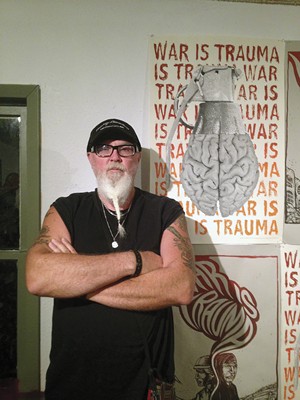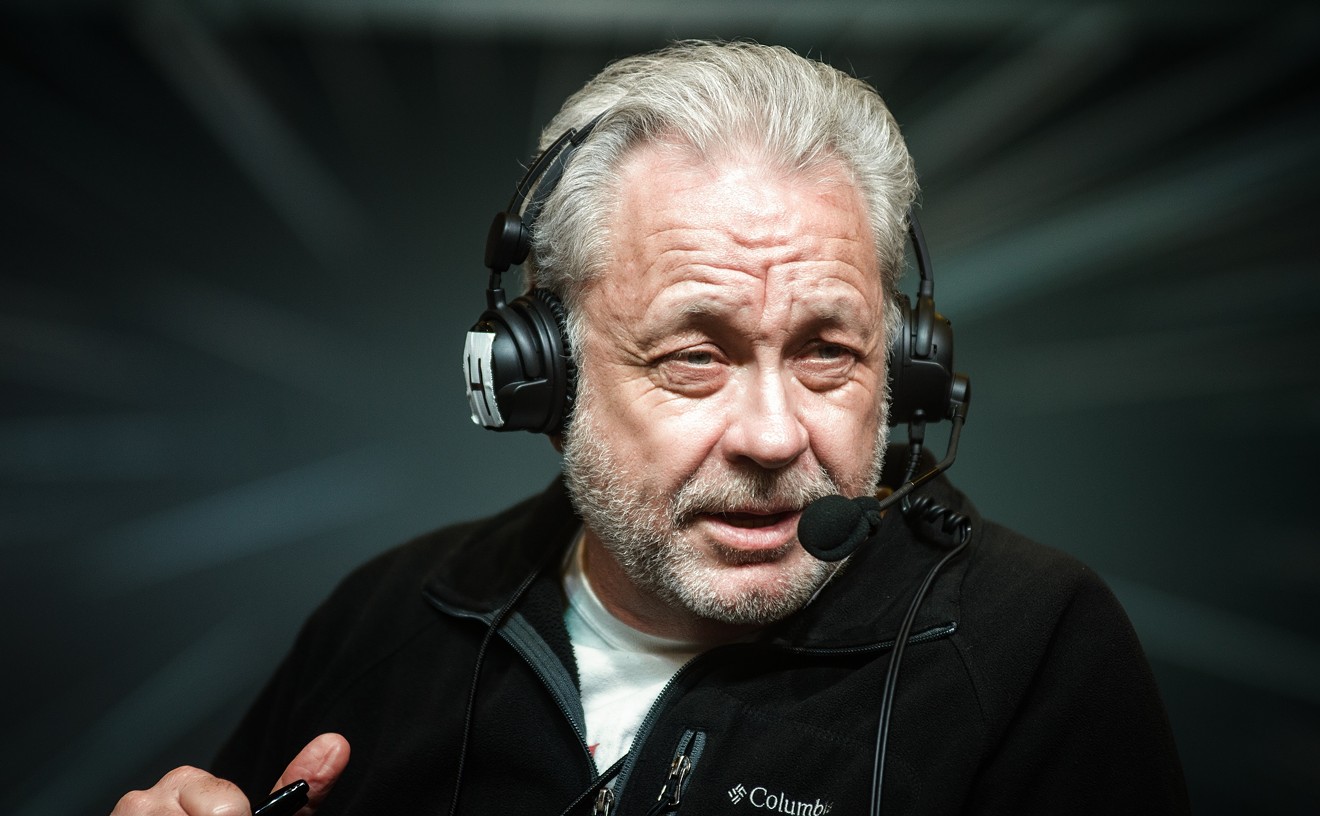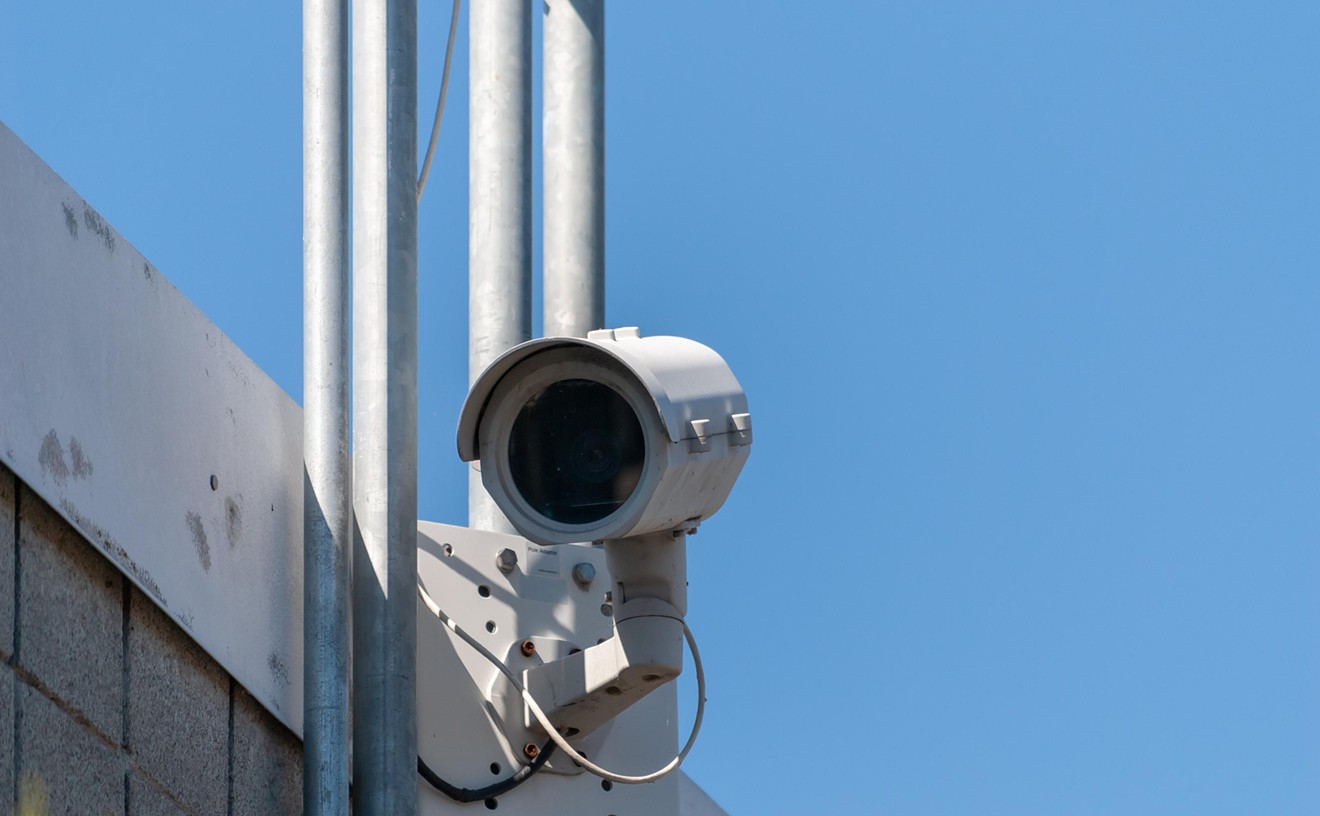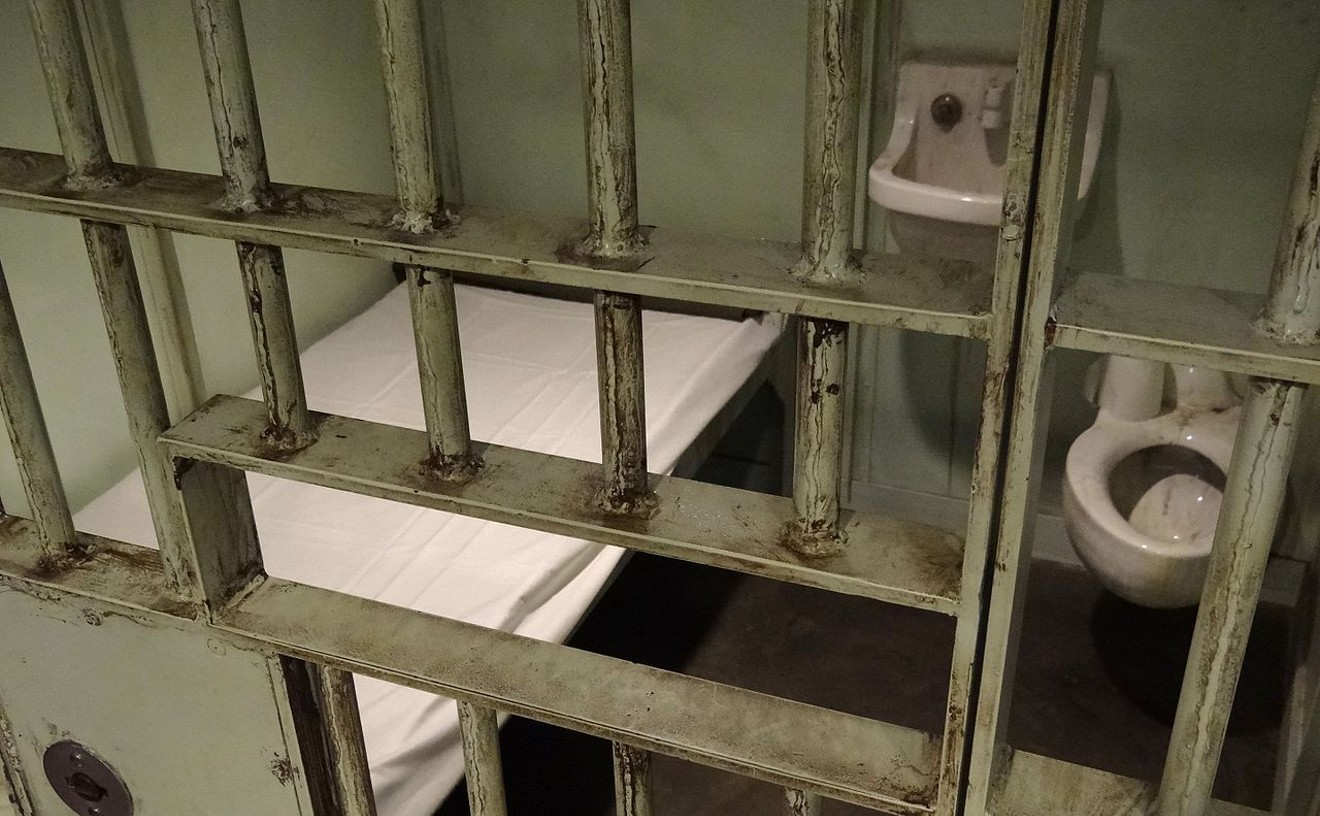It’s just a small amount of a medical-grade cannabis of the sort available now or soon in Colorado and 27 other states, but it’s enough to control the pain in her hip and to alleviate depression and anxiety she suffered after leaving the service. It could also net her jail time and a $500 fine in Texas if a police officer ever caught her lighting up.
Cochran-Morgan isn’t happy about that last part, but she’s not hiding her marijuana use either.
“People always ask me if I’m afraid of ‘The Man,’ and I’m like, ‘Who’s this man? Are you going to introduce me to The Man, because I would love to meet this man,’” Cochran-Morgan says. “What I found is that it’s not The Man. It’s fear. It’s just propaganda. And once you get through that fear and start educating people, The Man ceases to exist. That’s all I want to do. I want to help educate people [in the Texas Legislature and beyond]. I want to give them tools to make educated choices, not opinion.”
A successful real estate agent with a home on the outskirts of Dallas, she’s not afraid to discuss her cannabis use because she’s no longer alone. More than 1,600 Texas veterans have stepped out of the shadows to talk about their marijuana use with legislators, the media and anyone else who’ll listen to their harrowing tales of painkiller addiction and suicide. They’re the vanguard of the medical marijuana lobbying effort that’s making battle plans to bring their cause to Texas lawmakers this legislative session. They say they’re tired of being considered criminals when they have no choice but to use marijuana for service-related injuries because the alternatives — painkillers and psychotropic drugs — are killing too many of them.
They’ve come together as part of Operation Trapped, a veteran lobbying movement with connections to two other marijuana lobbying groups, Texas NORML and the Marijuana Policy Project. They’re supporting passage of state Sen. Jose Menendez’s SB 269, which seeks to expand the Texas Compassionate Use Act and allow any Texas resident with a doctor’s recommendation access to medical marijuana.
Menendez, a San Antonio Democrat, tried to pass a similar bill in the 2015 legislative session, but it never made it out of the Senate’s Health & Human Services Committee. Instead legislators passed the Texas Compassionate Use Act. It allows patients with a rare form of epilepsy access to a cannabis oil stripped mostly of the chemical compound THC, which gets users high. The act leaves out more than 1.7 million Texans who could benefit from medical marijuana. Menendez wants to increase the number of medical conditions that qualify for medical marijuana and allow patients access to the whole plant, not just low-THC oil. (That’s an important point for medical marijuana advocates, who contend that marijuana contains several compounds that are beneficial in treating a variety of ailments.)
“I filed this bill because doctors, not politicians, should determine the best treatment for severely ill Texans,” Menendez said at the Dec. 6 press conference where he first introduced the bill. “This is a legitimate medicine that can help a variety of sick people from a grandmother suffering from cancer to a veteran coping with PTSD.”
It won’t be cancerous grandmothers stalking the halls of the Texas Capitol session, though, trying to persuade lawmakers to step aboard the medical marijuana bandwagon. For that, leave the heavy lifting to the vets. They're ready.
Cochran-Morgan says she smokes marijuana to combat service-related anger issues, anxiety, depression and feelings of detachment. She also uses it to manage the chronic pain from hip dysplasia, a congenital deformation of her hip that has worsened since she got out of the Navy in 2010.
The blonde, green-eyed Carrollton native didn’t become a pot smoker until after she got out of the Navy. She joined in 2004, enlisting to help pay for college. As a Navy corpsman, she spent a year in the Middle East, working with convoys, troops on the base and any type of victim of war, sickness or starvation. Then her hip dysplasia began to worsen, causing muscle spasms that led to the end of her six-year military career.
After her service ended, she found herself visiting VA hospitals on a regular basis, receiving hydrocodone for pain and higher doses of muscle relaxers. A former health insurance worker, she says she began to experience social anxiety whenever she approached a client’s home, and struggled with anger. More medications followed, some of which she says only made her problems worse.
She says she felt as if she were trapped in a pill bottle, and her newfound alcohol abuse wasn’t helping. She began lashing out at loved ones, including her husband, whom she met on a dating website in 2013. She struggled to get out of bed because the depression and the medications’ side effects don’t mix well.
“I was on so much medication that I was like, ‘There has to be a better way,’” she says.
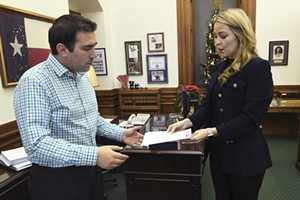
Kate Cochran-Morgan meets with Kevin Fletcher, legislative aide for state Senator Jane Nelson, while lobbying for medical marijuana on Dec. 14, 2016.
John Anderson
In 2015, Bass started a project that asked veterans to write their name (unless they wished to remain anonymous), their branch and dates of service, combat operations and disability on a slip of paper and place it inside an empty pill bottle and bring it to the monthly Texas NORML meeting in their area. They could also mail it to an Austin address listed on Operation Trapped’s website.
Alongside the slip of paper would go a toy plastic soldier.
He planned to display the pill bottles the following year on Veterans Day, then again in early February 2017 at a medical marijuana educational exhibit at the state Capitol when legislators will discuss Sen. Menendez’s SB 269.
The image of a toy soldier trapped in a pill bottle resonated with Cochran-Morgan and thousands of Texas veterans who signed Bass’ petition urging legislators to expand the Texas Compassionate Use Act.
Cochran-Morgan spoke at the 2015 Veterans Day press conference in front of the state capitol when Bass announced Operation Trapped’s mission, and she spoke at Menendez’s Dec. 6 press conference. She wasn’t alone. Along with the mother of a child with autism and epilepsy, Cochran-Morgan also stood alongside Amanda Berard, a veteran and pediatric nurse from San Antonio, who spoke of how expanding the medical marijuana policy could also help “Texas tiniest patients,” some of whom Berard says have received medications with side effects four or five pages long.
“A lot of people are looking for a little bit more control [when they choose to use marijuana],” Berard says. “Pharmaceutical takes away a lot of control.”
David Bass was drinking coffee at the Under the Hood Cafe in Killeen when he saw the small painting of a toy soldier trapped in an empty pill bottle hanging on the wall. The image instantly struck him because that’s how the 60-year-old retired Army major felt when he was taking painkillers for chronic pain and psychotropic drugs for his service-related post-traumatic stress.
He’d fought in both Desert Storm and Operation Iraqi Freedom. He’d seen soldiers killed and injured. A mortar once destroyed his sleeping quarters where he’d normally take a nap after a shift, and he witnessed a group of soldiers from Arkansas get slaughtered by a barrage of rockets, followed by their sergeant yelling, “Stop crying! This is how God makes us strong.”
When he retired from the military after 21 years of service in 2006, Bass began having trouble sleeping, then became paranoid and started stashing guns in every room of the house, as well as on his person everywhere he went.
The VA doctor diagnosed him with post-traumatic stress disorder and prescribed powerful psychotropic drugs to combat it. But their side effects, he says, often made him feel worse than his mental illness. “I would rather be dead than use some of those drugs,” he told the Observer shortly before Christmas.
Bass wrote in a May 11 letter to Lt. Gov. Dan Patrick, “The opioid medication was addictive and the psychotropic drugs had terrible side effects. I researched medical cannabis and discovered that thousands of veterans testify that cannabis is effective for chronic pain and PTSD. I found out for myself that it is effective to relieve my chronic pain and the symptoms of PTSD.
“Unfortunately I am labeled a criminal in our state because I choose to use cannabis. I am not a criminal. I am a retired military officer, a homeowner, a taxpayer and a voter.”
After his retirement out of Fort Hood in 2006, Bass began going to the Under the Hood Cafe because he says it felt like a safe place for veterans to hang out, and he enjoyed their company and conversation. The cafe was modeled after a famous GI coffee house from the Vietnam War era called “The Oleo Strut.” It opened in the height of Operation Iraqi Freedom and was billed as a place for soldiers from Fort Hood to spend their off-duty time. The Fort Hood chapter of Iraq Veterans Against the War once used the cafe as a staging area for anti-war marches.
When he saw the painting of the toy soldier trapped in an empty pill bottle Bass told the cafe manager Malachi Muncy that the painting was “really powerful because that’s how I felt.”
Muchy replied, “Me too. That’s why I created it.”
Bass says it’s not the Veteran Affairs Department’s fault that many Texas veterans find themselves trapped like the toy soldier in the empty pill bottle. He was prescribed Paxil first but experienced bad side effects, including anxiety, insomnia and decreased sex drive. He tried Zoloft next, but battled similar side effects with suicidal ideation thrown into the mix. He was then switched to Prozac, which he says helped, though he experienced weight gain over time and insomnia, anxiety, sexual dysfunction and suicidal ideation. He says he tried to cover up all the side effects with alcohol, which didn’t mix well with the painkillers he was taking for service-related noncombat injuries.
“VA doctors are trying to help us,” he says. “But their only answer is FDA-approved [medications like] opioids, which are extremely addictive. We have a lot of veterans who have died from overdoses.”
More than 22 soldiers a day commit suicide, according to a 2012 study by the U.S. Department of Veterans Affairs. Veterans’ addiction to opioids and fatal overdoses from them is almost double the national average, according to a 2013 analysis by the Center for Investigative Reporting.“Cannabis wasn’t a gateway drug for me. It was an exit drug.”
tweet this
The painting inspired Bass to create Operation Trapped in 2015, but it was his discovery of cannabis’ effects on his service-related mental health issues and chronic pain that led him to become an advocate for medical marijuana in Austin three years earlier. “Cannabis wasn’t a gateway drug for me,” he says. “It was an exit drug.”
He says he thought his story of kicking his opioid addiction and his use of psychotropic medications with marijuana was unique, but then he met other Texas veterans with similar stories, some of whom had been using marijuana for post-traumatic stress since the Vietnam War.
Clifford Deuvall was one of those veterans. He was serving in the Air Force when he was injured during the evacuation of Saigon in 1975. “I didn’t know I was injured,” says the 62-year-old Fort Worth native. “The blast went off, and I was far enough away from the radius but felt like I got pushed to the ground. I lost my right eye eventually, received a metal plate in my right arm, knee surgeries and total knee replacement.” He was also diagnosed with glaucoma and post-traumatic stress disorder, though he says it was known as “major depressive disorder” when he received the diagnosis.

From left, Keith Crook, David Bass, Ian Benious, Cliff Deuvall and Kate Cochran-Morgan, all veteran advocates for Operation Trapped.
Courtesy Kate Cochran-Morgan
Deuvall’s breaking point came when a VA doctor prescribed him methadone, a synthetic opioid often used to treat heroin addiction, in 2005. He says the neurologist prescribed it because his 16 other prescriptions were no longer combating his chronic pain. Later, he asked the doctor how long he’d need to take methadone, and he says he was told, “The rest of your life.”
Fours years later, Deuvall says he looked like a heroin addict suffering from wasting syndrome. He’d lost his teaching job and his will to live. “It took me out of my life,” he says. “I was not able to function at all.”
Like Bass and Cochran-Morgan, Deuvall also related to the toy soldier trapped in an empty pill bottle, and he wanted control of his life back. He did what educators normally do. He researched, and he came across several articles about Dr. Raphael Mechoulam.
In 1964, Mechoulam carried 5 kilos of confiscated Lebanese hashish in a plastic bag on a public bus to his laboratory at the Weitzmann Institute in Rehovot, Israel. A holocaust survivor, and later professor of medicinal chemistry at the University of Jerusalem, he’d obtained it from the police and intended to study the marijuana plant’s key compounds. It’s a study that led to his becoming known as the “father of THC” when he identified the key psychoactive component in cannabis, tetrahydrocannabinol (THC).
He’s now overseen two generations of cannabis research from his lab in Jerusalem. He’s credited for persuading Israel’s Ministry of Health to establish a medical cannabis program in 1992. He also discovered the brain’s endocannabinoid system, a group of cannabinoid receptors located in the brain and throughout the central and peripheral nervous systems. The receptors act as neuromodulators for a variety of processes such as motor learning, appetite and pain sensation.
He wrote in his 2007 research paper “Cannabinoids in Health and Disease,” which appeared in Dialogues in Clinical Neuroscience, “Numerous diseases, such as anorexia, emesis, pain, inflammation, multiple sclerosis, neurodegenerative disorders (Parkinson’s, Huntington’s, Tourette’s and Alzheimer’s), epilepsy, glaucoma, osteoporosis, schizophrenia, cardiovascular disorders, cancer, obesity and metabolic syndrome-related disorders, to name just a few, are being treated or have the potential to be treated by cannabinoid agonists/antagonists/cannabinoid-related compounds.”
Mechoulam also found cannabis limited the association between stimuli like loud noises and the stress from past traumatic situations. He claims cannabis could help patients with post traumatic stress by reducing their association between noises or flashes of light with past traumatic situations. It’s a claim supported by Deuvall, Bass, Cochran-Morgan and other Operation Trapped veterans, many of whom claim they have experienced it first-hand.
They’re not alone in their claims. Dr. Lester Grinspoon, a professor of psychiatry at the Harvard Medical School, wrote in a 1998 article “The Use of Cannabis as a Mood Stabilizer in Bipolar Disorder: Anecdotal Evidence and the Need for Clinical Research” in the Journal of Psychoactive Drugs, “A number of patients find cannabis useful in the treatment of their bipolar disorder. Some used it to treat mania, depression or both. They stated that it was more effective than conventional drugs, or helped relieve the side effects of those drugs. One woman found that cannabis curbed her manic rages.”
Deuvall says marijuana restored his life, and he wanted other medical patients to be afforded the same opportunity without becoming a criminal to do so. He formed Waco NORML, a marijuana advocacy group, and headed to Austin in 2010 to advocate for passage of a comprehensive medical marijuana bill. He says legislators kept telling him over the years, “It’s not the right time. You have to go on these medications that are approved by the FDA.”
“But we’re like, ‘All the medications are killing people with side effects two pages long,’” he says. “It’s the system. It’s broken, and it’s hard to fix a broken system.”
Dr. Elias Jackson stood alongside the Operation Trapped veterans and a dozen other supporters at Sen. Menendez’s Dec. 6 press conference in Austin. Like some of the other supporters of SB 269, he was aware of Mechoulam’s breakthroughs in cannabis research. He studies cannabis at the molecular level at his lab in Houston.
A former research scientist at Yale School of Medicine, Jackson says he used to think marijuana in any form couldn’t be used in a positive manner, other than for his friends in college who loved to smoke and hang out. But in 2012, he was teaching medical school at the American University of Antigua when he says he learned epileptic patients were using marijuana effectively to treat their seizures.
“To notice that epileptic patients were getting their seizures under control with cannabis was a big deal for a research scientist,” says Jackson, whose research focuses on defining cellular, molecular and immunological mechanisms governing cells’ interactions and dysfunctions. “We didn’t formulate drugs to see if it works, yet here is a substance [marijuana] that doesn’t have secondary complications, and doesn’t seem to be a gateway drug. It is actually working naturally” with the endocannabinoid system.
Like many other Texans, Jackson, who received his doctoral degree at the University of Texas Medical Branch at Galveston, says he has family members who are veterans battling post-traumatic stress, some of whom can’t handle fireworks or celebrations, like some epileptic patients. He began to research cannabis, reading scholarly studies and articles, and learned about the endocannabinoid system. He says he learned that the system involved every physiological aspect of our being. “It’s been shown that medicinal cannabis actually has a neuroprotective property,” he said at a presentation for Republicans Against Marijuana Prohibition and Young Americans for Liberty in late November 2014. “So when we look at diseases such as Alzheimer’s, the Salk Institute was able to show the plaquing forming Alzheimer’s was being blocked by medicinal cannabis.”
Jackson had opened a biotech firm called Vyripharm Biopharmaceuticals in 2013 in Houston with Dr. David Yang, former chief of radio-theranostics at the Department of Cancer Systems Imaging at the MD Anderson Cancer Center. They’re studying the varying uses of cannabis on the endocannabinoid system. They’ve also been researching its effects on cancer, though Jackson wouldn’t share specific details since they plan to release the data early this year. “It is absolutely outstanding what we’ve seen,” he says.
Mechoulam claims that a number of people use cannabis for a variety of cancers. “Some of them state that this is the only thing that helped them,” he said in a live discussion in December 2015 at the High Times Business Summit. “Maybe? Maybe not. We don’t have a single, good clinical trial in cancers. Any cancers! This is a shame.
“We know that cannabis, or some cannabinoids are pretty good in some types of pain,” he added. “But again, we don’t have good clinical trials. As a matter of fact, we barely have any clinical trials. We need clinical trials! Work in mice is fine but we have to advance.”
But clinical trials are only allowed under the strictest conditions in the U.S., since marijuana is still classified as a Schedule I controlled substance, the most restrictive category by the U.S. Drug Enforcement Administration. It’s a classification the federal agency refused to change in August 2016. “The DEA requested a scientific and medical evaluation and scheduling recommendation from the Department of Health and Human Services,” acting DEA administrator Chuck Rosenberg wrote in a July 19, 2016, letter to a petitioner requesting the schedule change. “The HHS concluded that marijuana has a high potential for abuse, has no accepted medical use in the United States, and lacks an acceptable level of safety for use even under medical supervision.”
Congress recently passed legislation allowing VA doctors to discuss medical marijuana with veterans in states where the drug is medically legal to prescribe. The state of Colorado also approved a $2.15 million study of marijuana’s effects on post-traumatic stress in September 2016. Researchers from the Multidisciplinary Association for Psychedelic Studies, the University of Pennsylvania, the University of Colorado, Johns Hopkins University and the Scottsdale Research Institute are conducting the study to find information related to marijuana dosing, composition, side effects and specific areas of benefit.
Dr. Sue Sisley, an Arizona-based physician serving as principal investigator of the study, says they’re testing the hypothesis that cannabis may improve post-traumatic stress symptoms in a dose-dependent manner. They’re doing so using a two-phase random, placebo controlled, multisite study, involving 76 participants who will smoke randomly assigned types of marijuana. “I have no preconceived notions about the outcome of the study,” she told Stars and Stripes in early September 2016. “I’m not pro-cannabis; I am strictly pro-science. I’m actually not a fan of cannabis, and I’ve never tried it personally. I care deeply about our military veterans, and I am determined to find new treatments for PTSD — besides the only two approved medicines on the market, Zoloft and Paxil, which are highly disappointing.
“Nobody is arguing cannabis is a cure for PTSD,” she added. “What we are hoping is that cannabis is alleviating the suffering of PTSD patients and not just masking it. This is a distinction that can only be evaluated through a randomized controlled trial.”
The lack of credible studies mentioned by Rosenberg from the DEA is part of the reason why Jackson says his company conducts fully credible studies. Passage of Sen. Menendez’s bill would allow his cannabis research to expand, he says.
“Imagine, if we can show that cannabis kills cancer cells, if that is proven reliable, that is when you can say, ‘Let’s take the next step,’” he says.
U.S. Navy veteran Romana Harding had been witnessing what some would call government stonewalling ever since she started catching a bus ride to Austin with Republicans Against Marijuana Prohibition, a lobbying advocacy group from Houston. She’s watched some politicians ignore anecdotal evidence and demand more viable clinical studies even though the federal government’s stance on cannabis as a Schedule I drug prohibits research by U.S. scientists.
“The legislators know it’s a matter of when not if it passes,” she says.
A survivor of the military’s “invisible war,” Harding has been using marijuana ever since she found herself in a closet pointing the barrel of .45 underneath her chin. She held on, and then later her uncle, a World War II veteran, told her about his experience smoking a joint with some French soldiers after Normandy on D-Day. He told her how it had helped him, then pulled out a joint and smoked it with her because she says he was afraid she’d turn to alcohol and drink herself to death.
“All of my family is dead from alcohol,” she says. “Only the cannabis smokers are alive and kicking.”
Harding, who lived in California at the time, eventually received a prescription for marijuana for chronic pain and insomnia. She says she received a diagnosis for post-traumatic stress in December 2011. Unlike many other veterans, her symptoms weren’t the result of combat but sexual trauma.
She served in the Navy from 1976 to 1980 and says she was raped and beaten by a student pilot in the Iranian air force when they were both stationed at the Naval Air Station Whiting Field in Florida. She says she was then raped by a Naval supervisor when she was closing up the base auto shop late one night. She says he approached her from behind, put his hand over her mouth and raped her. It would continue for another two years.
“He then zipped up, threw a dirty shop towel at me and told me not to tell anyone,” Harding told Texas Monthly in a June 2014 article. “He was buddies with the division chief and the commanding officer, so I gave up. I became his personal sex slave.”
Harding appeared using a pseudonym in the Texas Monthly article, along with David Bass and a couple of other Texas veterans who appeared using only their first names. They all said they smoked marijuana to combat the effects of post-traumatic stress and chronic pain from service-related combat and noncombat injuries because of psychotropic drugs’ often devastating side effects and the FDA-approved painkillers’ addictiveness.
“I wasn’t ready to come out of the closet yet because using cannabis is dangerous here in Texas,” she says.
Harding says their interview with Dr. William Martin for the Texas Monthly article was the beginning of a Texas veterans movement that has grown larger with each passing year. She says he brought them all together and helped them to realize that they were not alone in their suffering.
“We call him, ‘Oh captain, my captain’ from Dead Poets Society,” she says. “He’s done a fantastic job uniting us and helping give us a voice.”
She now works as a veterans outreach coordinator for Houston NORML and makes “canna caps” (a gel cap of liquid cannabis with coconut oil) in a crockpot for her post-traumatic stress. Over the years, she’s educated herself about medical marijuana. She knows that “Granddaddy Purple” helps a patient sleep at night, and she learned to keep different strains of marijuana in dark containers for nighttime use and lighter ones for daytime use.
Harding also uses cannabis for the aches and pain she still feels in her ankle, which she says her Naval supervisor shattered with a steel-toe boot when he kicked her, and in her jaw, which she says he shattered when he punched her in the face. She claims she was only taking the advice of her vet center doctor when she became an advocate for medical marijuana in Texas.
Since she’s been traveling to Austin over the past few years, Harding has heard all kinds of reasons why some law enforcement officers and legislators have misgivings about expanding medical marijuana legislation in Texas. One law enforcement agent claimed supporters were simply trying to pave the road for full decriminalization of marijuana.
Former Denton County Sheriff Will Travis testified about the evils of reefer madness during the 2014 legislative session as a representative of the Texas Sheriff’s Association. He also confused hemp with marijuana and tried to argue that low-level cannabis oil would get a person high, something several legislators disputed.
Harding appeared with Cochran-Morgan and other Texas veterans before Sen. Donna Campbell and the Senate Veterans Affairs Committee in early March 2016 to share how marijuana has helped them over the years. Texas is currently home to nearly 1.6 million veterans, 500,000 of whom participated in the Iraq and Afghanistan wars. The Washington Post and the Kaiser Family Foundation conducted a poll in 2014 that found 40 percent of Iraq and Afghanistan veterans showed signs of emotional and mental problems characteristic of post-traumatic stress.
Like Cochran-Morgan, Harding didn’t think Campbell understood why the expansion of current Texas medical marijuana law to include other medical patients was desperately needed as a safer alternative to the painkillers and psychotropic drugs veterans are currently required to take. “Our legislators have such an uneducated idea about what cannabis is, and they really bought into the whole [gateway drug] lie,” she says.
Campbell’s Chief of Staff Jon Oliver points out that the Texas senator did vote for the Texas Compassionate Use Act. Even though she hasn’t had the opportunity to read Sen. Menendez’s legislation yet, she has met with Texas veterans who’ve presented her with literature that Oliver says seems promising.
Her willingness to listen to veterans’ views on medical marijuana also comes at a time when the U.S. House of Representatives and Senate both voted to allow VA doctors to discuss medical marijuana with their patients as a treatment option in May 2016.
“If the need is there, the science is there (with good peer-reviewed evidence), and cannabis is helping veterans, she would be open to supporting that,” Oliver says.
She'll get plenty of chances to hear how cannabis is helping veterans when the legislative session begins. Harding has joined with other Operation Trapped veterans who are determined to raise awareness. Cochran-Morgan says they’re holding a legislative training day session in mid-January, and they plan to set up an educational display about medical marijuana in early February. They’ll be showcasing hundreds of toy soldiers trapped in pill bottles they collected from Texas veterans over the past year.
“Yes, we know we have a medical marijuana bill,” she says. “We want to expand it. That’s why we’re here. We are the other percentage left out of the bill. We’re all trying to be very respectful because our military background is telling us we need to hold back. But my dad [who’s former Army] pulled me aside and said, ‘If you do not be the daughter I know you are, I will be disappointed. You need to speak, and you make sure they hear you.’”



